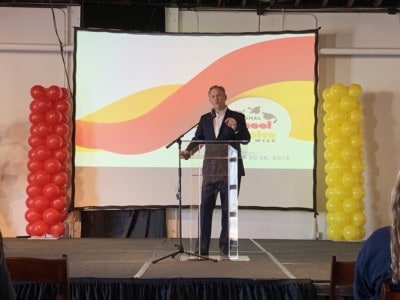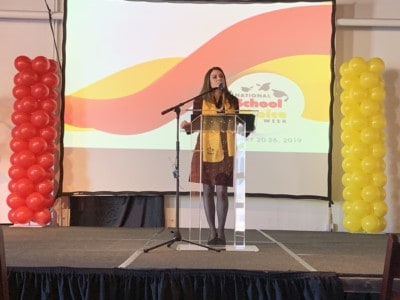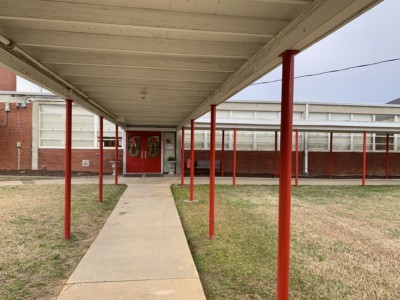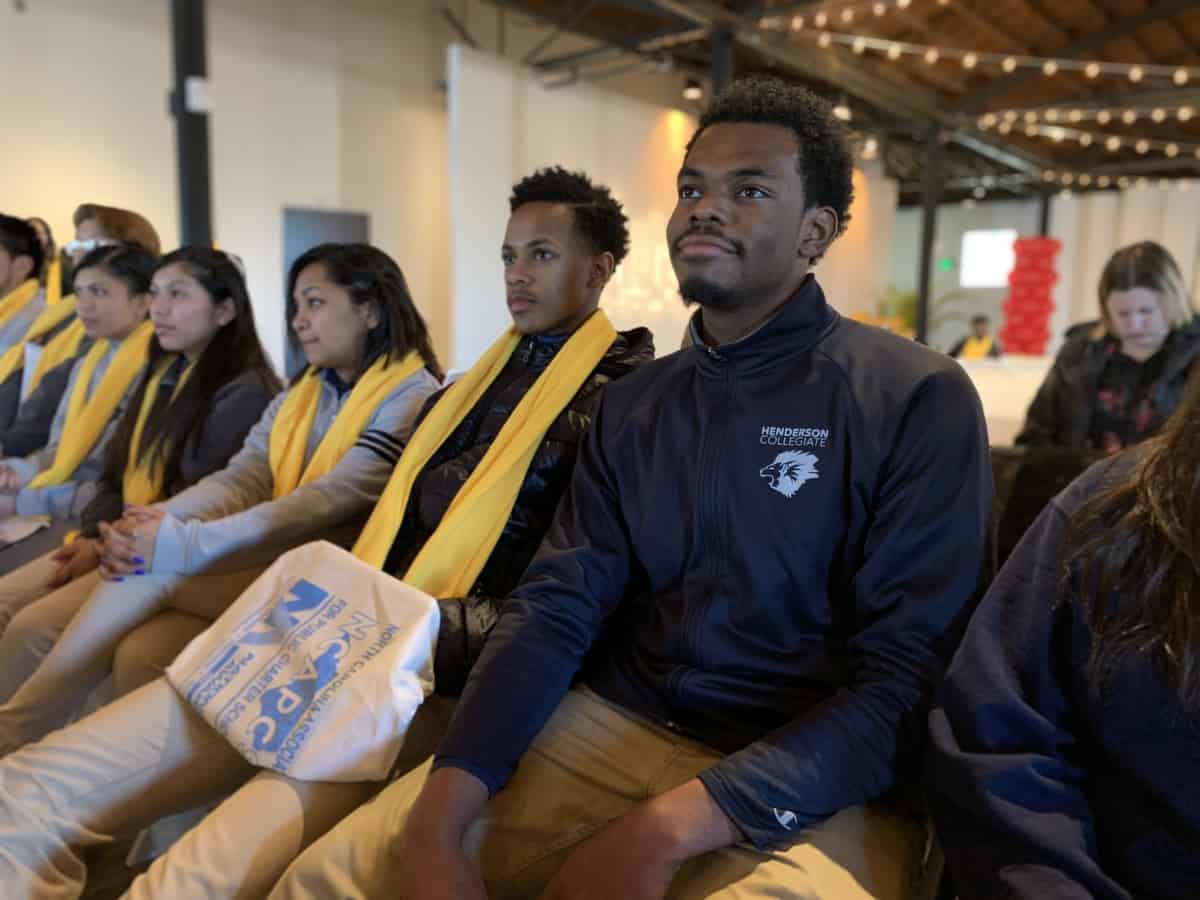
Victor Clifton remembers thinking high school was going to be all about varsity jackets and cheerleaders, school dances, and guys asking girls for their phone numbers.
But freshman year was far different than he’d imagined. His was the first high school class at Henderson Collegiate, so there were no varsity jackets — there weren’t even any varsity teams when he got there. And the girls were the same girls with whom he had gone to middle school. But what he remembers most, he said, was extra homework and extra hours, relationships and networking, being challenged and molded for future success after graduation.
Clifton is a senior at the charter school, which he said promised when he first enrolled in the fourth grade that he would one day go to college. Next year, he will attend Duke University — on a full scholarship.
“After all my years at HC, I can finally and truly understand the value of the school,” he said. “And there is so much I am grateful for. Who knows where the road would have gone without Henderson Collegiate.”
Clifton is lauded as a success story of the public charter school system. Speaking to more than 100 people Tuesday at a National School Choice Week (NSCW) rally at The Fairview in Raleigh, Clifton was among many who said offering a variety of choices for schools means more opportunity for students.
NSCW is an organization that promotes alternatives to traditional public schools and advocates for a range of options for students. The organization hosts events nationwide for one week each year and invites local leaders, educators, and students to talk about their experiences. Tuesday’s rally kicked off a week-long series of events in North Carolina. Aimee Viana, an assistant secretary in the U.S. Department of Education, Lt. Gov. Dan Forest, and Joe Maimone, chief of staff to state Superintendent of Public Instruction Mark Johnson, joined charter school teachers and students as speakers at the event.
“We’ve made fantastic strides in the last decade in North Carolina, and there’s great strides still ahead of us, as well,” Forest said. “I think one of the things we have to keep in mind is that school choice really is about our kids. It’s about young people. It’s not about institutions. It’s not about traditional public school institutions. It’s not about a charter school institution. It’s not about private school institutions, or homeschool. It’s not about those things. It is about the young people. It’s about the kids. It’s about providing the best opportunity for that individual child to explore their potential and get the most out of their education.”
State lawmakers lifted a 100-school cap on charter schools in 2011. Less than eight years later, the state now has more than 103,000 students attending 185 charter schools, according to Maimone, and officials believe that number will be 200 by the end of the year. Meanwhile, the state has a host of other choice options for students, including two different kinds of opportunity scholarships that help pay for low-income students or students with disabilities to go to private schools.
Opponents say that school choice leads to privatizing the public education system and that many of the choices being offered are not well-regulated, leading to segregation in schools and less funding for local districts. Forest acknowledged those concerns.
“There’s great division amongst the education world,” said Forest, who chose to home school his children. “When we say school choice, it’s like the hair on the back of some people’s neck stand up and they go, ‘School choice, well what does that mean?’ What it means for us is open opportunity for our kids. Choices for parents.”
Forest evoked an analogy often used when discussing school choice: the grocery store. Walk into any grocery store and families have a myriad of choices for something as common as peanut butter. Why not use the same approach for schooling?
“But what happens when all my peanut butter options are equally unpalatable, except for the ones that are priced beyond my means? Does the fact that I have a choice really make much of a difference at that point?” wrote Justin Parmenter, a seventh-grade language arts teacher at Waddell Language Academy in Charlotte, in a 2018 op-ed for The Washington Post. In the op/ed, he says that there isn’t much quality control for the state’s charter schools, that they aren’t well integrated, and that those which serve low-income students struggle.
But the rhetoric from teachers and students at Tuesday’s rally — all representing charter schools in the state — was that school choice means equality and opportunity.
“Too often, a student’s zip code or socioeconomic status determines what kind of education he or she will get and what kind of support his teachers will get,” said 2018 Charter School Teacher of the Year Courtney Samuelson. “And in many neighborhoods and schools, these students that we may love are not getting the education they deserve because of systems in place that do not push them or challenge them, and even sometimes repress them.”
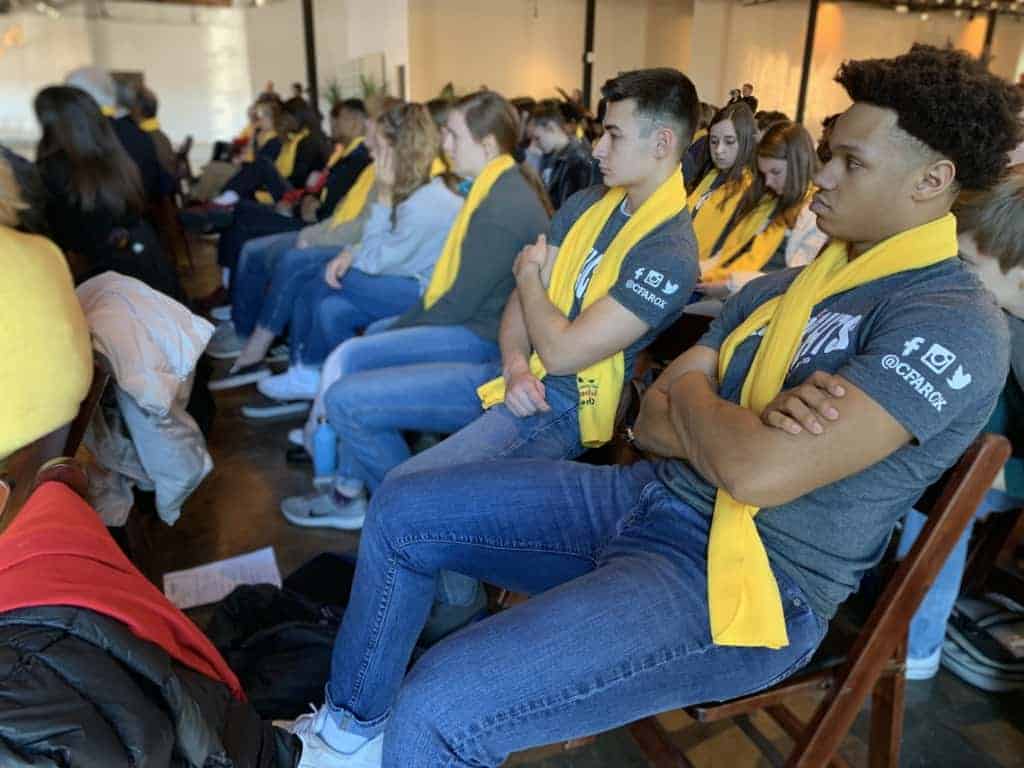
Samuelson said education should be an equalizer, and by providing more choices in types of schooling available to North Carolina students, lawmakers are leveling the educational playing field across the income spectrum.
“Choice is freedom,” she said. “Choice is autonomy. Choice is access. Choice gives us opportunities. And unfortunately, choice has historically belonged to people who are wealthy or who have resources. But … in North Carolina, we’re getting choice to more and more families. We’re putting choice in the hands of families who want a better education for their students.”
For officials gathered at the rally, school choice means students are not locked into the same learning options that were available to the previous generations. Viana, who was a teacher and principal in Wake County prior to her move to Washington, D.C., said schools are not keeping up with changing times. She called for 21st Century education for 21st Century students.
“All students — no matter their race, their gender, their zip code, or their family education — deserve access to a high-quality education that best meets their individual needs,” she said. “The United States has developed and changed in many ways over the past 100 years, but very little has changed about the way we educate our students.”


